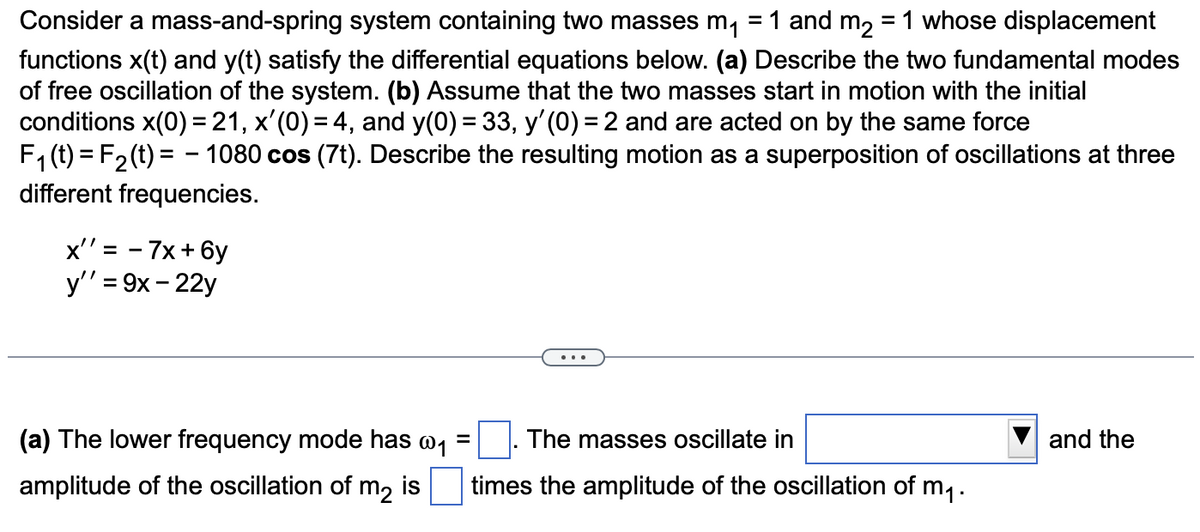Consider a mass-and-spring system containing two masses m, = 1 and m2 = 1 whose displacement functions x(t) and y(t) satisfy the differential equations below. (a) Describe the two fundamental modes of free oscillation of the system. (b) Assume that the two masses start in motion with the initial conditions x(0)= 21, x'(0) = 4, and y(0) = 33, y'(0) = 2 and are acted on by the same force F, (t) = F2 (t) = – 1080 cos (7t). Describe the resulting motion as a superposition of oscillations at three different frequencies. %3D %3D x'' = - 7x+ 6y y'' = 9x - 22y ... (a) The lower frequency mode has @1 The masses oscillate in and the amplitude of the oscillation of m, is times the amplitude of the oscillation of m,.
Consider a mass-and-spring system containing two masses m, = 1 and m2 = 1 whose displacement functions x(t) and y(t) satisfy the differential equations below. (a) Describe the two fundamental modes of free oscillation of the system. (b) Assume that the two masses start in motion with the initial conditions x(0)= 21, x'(0) = 4, and y(0) = 33, y'(0) = 2 and are acted on by the same force F, (t) = F2 (t) = – 1080 cos (7t). Describe the resulting motion as a superposition of oscillations at three different frequencies. %3D %3D x'' = - 7x+ 6y y'' = 9x - 22y ... (a) The lower frequency mode has @1 The masses oscillate in and the amplitude of the oscillation of m, is times the amplitude of the oscillation of m,.
Elements Of Electromagnetics
7th Edition
ISBN:9780190698614
Author:Sadiku, Matthew N. O.
Publisher:Sadiku, Matthew N. O.
ChapterMA: Math Assessment
Section: Chapter Questions
Problem 1.1MA
Related questions
Question

Transcribed Image Text:Consider a mass-and-spring system containing two masses m, = 1 and m2 = 1 whose displacement
functions x(t) and y(t) satisfy the differential equations below. (a) Describe the two fundamental modes
of free oscillation of the system. (b) Assume that the two masses start in motion with the initial
conditions x(0) = 21, x'(0) = 4, and y(0) = 33, y'(0) = 2 and are acted on by the same force
F, (t) = F2 (t) = - 1080 cos (7t). Describe the resulting motion as a superposition of oscillations at three
different frequencies.
= - 7x+ 6y
y'' = 9x - 22y
(a) The lower frequency mode has w1
The masses oscillate in
and the
amplitude of the oscillation of m, is
times the amplitude of the oscillation of m1.
Expert Solution
This question has been solved!
Explore an expertly crafted, step-by-step solution for a thorough understanding of key concepts.
Step by step
Solved in 3 steps with 2 images

Knowledge Booster
Learn more about
Need a deep-dive on the concept behind this application? Look no further. Learn more about this topic, mechanical-engineering and related others by exploring similar questions and additional content below.Recommended textbooks for you

Elements Of Electromagnetics
Mechanical Engineering
ISBN:
9780190698614
Author:
Sadiku, Matthew N. O.
Publisher:
Oxford University Press

Mechanics of Materials (10th Edition)
Mechanical Engineering
ISBN:
9780134319650
Author:
Russell C. Hibbeler
Publisher:
PEARSON

Thermodynamics: An Engineering Approach
Mechanical Engineering
ISBN:
9781259822674
Author:
Yunus A. Cengel Dr., Michael A. Boles
Publisher:
McGraw-Hill Education

Elements Of Electromagnetics
Mechanical Engineering
ISBN:
9780190698614
Author:
Sadiku, Matthew N. O.
Publisher:
Oxford University Press

Mechanics of Materials (10th Edition)
Mechanical Engineering
ISBN:
9780134319650
Author:
Russell C. Hibbeler
Publisher:
PEARSON

Thermodynamics: An Engineering Approach
Mechanical Engineering
ISBN:
9781259822674
Author:
Yunus A. Cengel Dr., Michael A. Boles
Publisher:
McGraw-Hill Education

Control Systems Engineering
Mechanical Engineering
ISBN:
9781118170519
Author:
Norman S. Nise
Publisher:
WILEY

Mechanics of Materials (MindTap Course List)
Mechanical Engineering
ISBN:
9781337093347
Author:
Barry J. Goodno, James M. Gere
Publisher:
Cengage Learning

Engineering Mechanics: Statics
Mechanical Engineering
ISBN:
9781118807330
Author:
James L. Meriam, L. G. Kraige, J. N. Bolton
Publisher:
WILEY